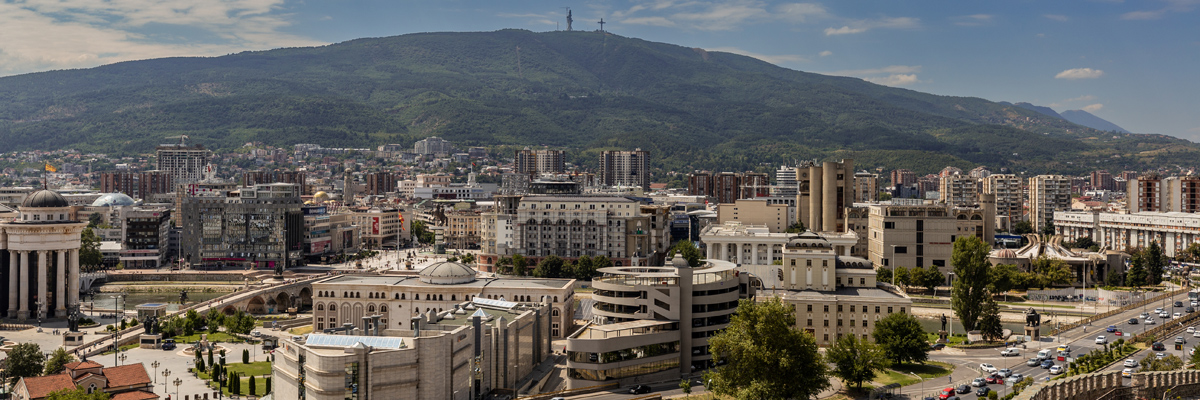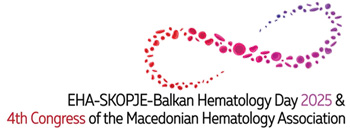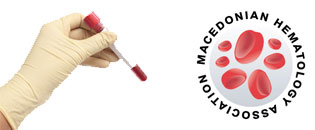MINUTES FROM THE CONGRESS
The Fourth Congress of the Macedonian Association of Hematology and the Sixth Balkan Hematology Day, jointly organized by the Macedonian Association of Hematology and the European Hematology Association (EHA), took place on April 25–26, 2024, at the Macedonian Academy of Sciences and Arts (MANU) in Skopje. This joint event marked a significant milestone in regional collaboration, bringing together over 250 participants, including clinicians, researchers, and pharmaceutical partners from across the Balkans and Europe.
The congress was officially opened by Academician Dimitar Efremov and Prof. Dr. Irina Panovska-Stavridis, who emphasized the significance of international cooperation and scientific exchange in advancing hematologic care. The hall at MANU was filled to capacity, reflecting strong interest and enthusiasm from the Balkan hematology community and beyond, underscoring the congress’s importance as a regional scientific platform.





In his welcome speech, Prof. Efremov highlighted the honor of hosting such a prestigious meeting, particularly focusing on lymphoproliferative disorders, a field where many attending experts are long-standing collaborators. Prof. Panovska-Stavridis expressed that it was an incredible feeling to be writing a new chapter in Macedonian hematology, knowing that every step forward brings the community closer to improved patient care.
The scientific program addressed recent advances in the diagnosis, prognosis, and management of B-cell malignancies. The EHA-Balkan Hematology Day on April 25 focused on lymphomas prevalent in the region, including mantle-cell lymphoma, Hodgkin lymphoma, large B-cell lymphomas, and marginal zone lymphoma. Sessions featured state-of-the-art lectures from esteemed European experts, complemented by case presentations from Balkan hematologists, fostering dynamic discussions and knowledge exchange.
On April 26, the Fourth Congress of the Macedonian Hematology Association continued with sessions on classification, diagnosis, and genetic subtyping of lymphoid malignancies. Notable topics included genomic profiling of lymphoid neoplasms, liquid biopsy of lymphoma, and advances in the biology and treatment of chronic lymphocytic leukemia (CLL). Special sessions were dedicated to follicular lymphoma, hairy cell leukemia, Waldenström's macroglobulinemia, and multiple myeloma, featuring insights from leading experts in the field.
The event was accredited by the European Board for Accreditation in Hematology (EBAH), ensuring participants received valuable continuing medical education. It also facilitated networking opportunities among clinicians, researchers, and pharmaceutical manufacturers, laying the groundwork for future collaborations and advancements in hematology.
The scientific program featured over thirty expert presentations covering a broad spectrum of topics. Special emphasis was placed on lymphomas, chronic lymphocytic leukemia, multiple myeloma, genetic innovations, biomarkers, personalized therapy, and the role of patient advocacy groups and NGOs in shaping healthcare policies. International speakers from Italy, the United Kingdom, Germany, Greece, Bulgaria, Croatia, Serbia, and other countries contributed to high-level discussions, sharing cutting-edge data and treatment approaches. The agenda balanced clinical insight with translational research.
This congress served not only as a scientific gathering but also as a key platform for strengthening regional cooperation. The discussions fostered new research initiatives and educational partnerships, supporting ongoing collaboration between Balkan hematology societies and the broader EHA network. Macedonian hematologists showcased their alignment with global standards, reaffirming their active role in therapeutic developments and research.
The event was made possible through strong support from pharmaceutical partners and medical sponsors, reflecting a shared commitment to social responsibility and the advancement of hematologic care.
The Fourth Macedonian Hematology Congress and the Sixth Balkan Hematology Day concluded successfully, leaving a lasting impact on participants and the regional hematology community. The event delivered high-quality scientific content, strong professional networking, and reinforced a sense of unity within the Balkan hematology field. It affirmed that North Macedonia is an active and respected participant in the European hematology landscape, with the expertise and ambition to drive future advancements in the field.















